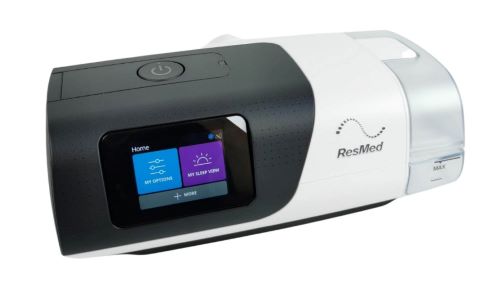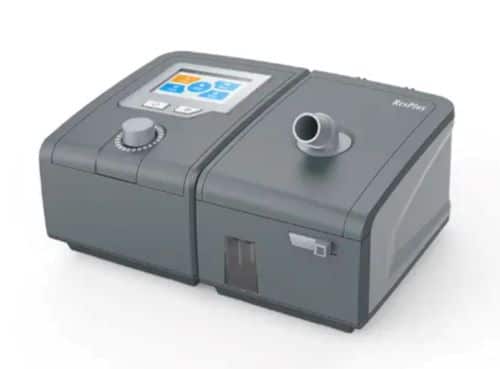Inspire Sleep Apnea Device Review 2025
Key Takeaways About the Inspire Sleep Apnea Device
- The Inspire sleep apnea device takes a new approach to treat sleep apnea, eliminating the need for an external machine or mask.
- Inspire may be an option for patients with obstructive sleep apnea seeking an alternative to CPAP therapy.
- Inspire is significantly more expensive than traditional CPAP machines, but many insurance companies and Medicare offer coverage for those qualifying for the device.
If you’ve been diagnosed with obstructive sleep apnea (OSA), you’ve likely heard of or used a continuous positive airway pressure (CPAP) machine or sleep apnea machine. The Inspire sleep apnea device treats OSA in an entirely different way. A physician surgically implants Inspire under your skin to stimulate your upper airway, keeping those airways open while you sleep. It is operated with a small remote for convenient use anytime, anywhere, making it an appealing option for people requiring CPAP machines for travel.
When we surveyed 600 CPAP users in July 2023, 64% of respondents reported CPAP-related symptoms, including dry nose or mouth, face redness, nosebleeds, nasal congestion, air leaks, sore throat, and difficulty sleeping. Even with these side effects, 76% of people surveyed reported notable improvement in their sleep. [1]CPAP Survey. 600 respondents. Conducted using Pollfish. Launched July 25, 2023.
The Inspire sleep apnea device offers an alternative to the unpleasant effects of using a CPAP mask and machine, while still treating sleep apnea and potentially improving sleep quality. Read more to learn how the Inspire sleep apnea device works and whether it may be right for you.
Why you can trust our expert review
Our team recommends products and services we feel strongly about, and will truly benefit our readers. We’ve spent more than 250 hours researching CPAP machines to give you the most accurate review of each model and brand. To make our selections, we:
- Interviewed industry experts
- Consulted with a respiratory therapist to confirm the accuracy and integrity of our reviews
- Researched 15 CPAP manufacturers and 45 models across the category
- Read real reviews from verified customers on trusted third-party sites, including the Better Business Bureau (BBB) and Trustpilot
- Reviewed academic research to better understand the details and benefits of CPAP therapy and how the devices work
Read more about our CPAP review methodology.
Pros and Cons
Inspire sleep apnea device vs. CPAP machines in 2025
| Cost* | $30,000-$40,000 | $1,004.00 | $649.00 |
| Insurance coverage | Varies by plan | Varies by plan | Varies by plan |
| Device type | Implant | CPAP machine | CPAP machine |
| Dimensions in inches (L x W x H) | 2 x 0.33 x 1.8 | 10.71 x 3.72 x 5.45 | 11.02 x 7.87 x 4.41 |
| Noise level in decibels | Undetectable | 27 | 30 |
| Warranty | Three years for the device (generator and leads), one year for the remote | Two years | Two years for the unit, one year for accessories |
| FAA-approved | Yes | Yes | Yes |
*Cost as of 2025
How does Inspire sleep apnea treatment work?
The Inspire sleep apnea device is an innovative approach to addressing and treating sleep apnea. Unlike CPAP machines, which are bedside devices delivering airway pressure through a CPAP mask, Inspire works inside the body. An Inspire-trained doctor surgically implants the device [2]Johns Hopkins Medicine. Hypoglossal Nerve Stimulation Implant for Sleep Apnea. Found on the internet at https://www.hopkinsmedicine.org/health/conditions-and-diseases/obstructive-sleep-apnea/hypoglossal-nerve-stimulation underneath the skin of your neck and chest, where it delivers gentle pulses to stimulate key muscles, keeping your airways open. The only equipment required besides the implant is a small remote, used to start the device at bedtime and stop it when you wake for the day.
The Inspire device [3]FDA. Inspire Upper Airway Stimulation. Found on the internet at https://www.fda.gov/medical-devices/recently-approved-devices/inspire-upper-airway-stimulation-p130008s090 is made of three components. The generator is the power component of the device, storing the battery and creating the electrical pulses. Two leads, or very small wires, connect to opposite ends of the generator. A respiratory-sensing lead senses your breathing and transmits the information to the generator. The generator then triggers the stimulation lead to send pulses to your airway muscles to open your airway and work with your breathing pattern.
Inspire is installed in an outpatient procedure, meaning you can go home the same day. Your surgeon will make three small incisions—one on your chest, one near your rib cage, and one on your neck. The generator is placed under the skin on your chest, the respiratory sensing lead under the skin near your rib cage, and the stimulation lead under the skin on your neck, near your tongue.
After installing the Inspire device and allowing time for your healing from surgery, your doctor will make adjustments to the settings using an external physician programmer for your sleep apnea needs. When you’re fully healed, and settings are in place, using Inspire involves simply turning it on using the remote when you’re ready for bed and turning it off when you get up for the day.
Is Inspire better than a CPAP machine?
Although a recent study found 94% of Inspire patients preferred it to CPAP, it isn’t better or worse—it’s just a different option. [4]Heiser C, et al. European Respiratory Journal. Jan. 1, 2019. Post-approval Upper Airway Stimulation Predictors of Treatment Effectiveness in the ADHERE Registry. Found on the internet at https://erj.ersjournals.com/content/53/1 Like with CPAP machines and CPAP masks, your condition, preferences, and lifestyle will help determine which model will work best for you.
Other things to consider include the overall cost [5]National Library of Medicine. Long-Term Cost-Effectiveness of Upper Airway Stimulation for the Treatment of Obstructive Sleep Apnea: A Model-Based Projection Based on the STAR Trial. Found on the internet at https://www.ncbi.nlm.nih.gov/pmc/articles/PMC4402668/ and whether your insurance will cover the device and procedure. You may also want to consider whether you want to undergo surgery to treat your sleep apnea. Aside from the initial surgery to implant the device, patients should expect additional procedures to replace the device’s battery, which lasts an average of 11 years.
Who can use Inspire?
Like CPAP machines and other medical devices, Inspire isn’t for everyone. Candidates for the Inspire sleep device have to meet the following criteria:
- Have a history and diagnosis of moderate to severe OSA
- Have tried CPAP without success
- Have a body mass index (BMI) below 35
- Be 18 or older
These are basic guidelines, but the Inspire website also has a questionnaire to help you determine whether you’re eligible for the sleep apnea device. To answer the questions, click the “Do I Qualify” button at the top of the Inspire website. From there, you will be asked the following questions:
- Why are you interested in Inspire? Choose from preselected responses like a history of CPAP mask discomfort, unresolved sleep issues, and travel limitations.
- Have you been diagnosed with obstructive sleep apnea? While there are other forms of sleep apnea, OSA is the most common form and the one Inspire is designed to treat.
- Have you tried CPAP? CPAP history and success or failure will help your doctor decide whether you’re a good candidate for Inspire.
- When was your last sleep study? If it has been over two years, Inspire doctors may want to perform another one to assess the current state of your sleep apnea.
- What is your height and weight? These measurements are used to calculate BMI. Inspire doesn’t recommend the device for patients with a BMI of 35 or higher, but your doctor will make the final decision.
After answering those questions, you will be asked to enter your contact information. From there, an Inspire-trained doctor will contact you to discuss whether you may be eligible for the device.
Are there any risks associated with Inspire?
Surgical risks associated with Inspire are not uncommon and usually go away on their own. Risks include swelling at the incision site, pain, infection, and temporary tongue weakness. In the case of pain or infection, your doctor may prescribe medication to treat it.
Most surgical risks are minor, but any surgery does have a slight chance of more serious risks. With Inspire, there is a small risk of more serious tongue issues like paralysis or atrophy following surgery. Providing your doctor with an accurate health history is important to determine whether you’re a good candidate for the procedure and to reduce the chance of risks related to surgery.
Besides surgical risks, some people may experience discomfort or unpleasant side effects from the Inspire sleep apnea device. These may be sensations like dry mouth, tongue discomfort, or feeling aware of the device. Side effects are normal and will likely go away with time or by having a doctor adjust the device’s settings.
Medications and other implanted medical devices
Based on our research, there are not any known conflicts with medications and the Inspire sleep apnea device. The only medications involved with the device would be over-the-counter pain medication following the outpatient procedure to implant the device or if your doctor prescribed pain medication following the procedure. You would want to make sure that any pain medication taken after the procedure would not cause any negative interactions with other prescription medications you take.
The Inspire website states that anyone with another type of implantable medical device, such as a pacemaker, should have the doctor responsible for these other devices contact their Inspire doctor. The doctor will then test the devices to make sure that they do not interact before proceeding.
Traveling with the Inspire device
It is safe to go through airport security screenings with the Inspire device, including millimeter wave detection scanners and metal detectors. However, the device could set off a metal detector, so it is a good idea to carry your Inspire Identification Card with you and to let the security personnel know that you have an implanted medical device.
How to get the Inspire sleep apnea device
Getting the Inspire sleep apnea device involves a few more steps than a traditional CPAP machine. You’ll first need to be diagnosed with obstructive sleep apnea, and from there, you’ll go through a series of steps to determine your eligibility for the device and move forward with treatment:
- Find out whether you’re eligible. The Inspire website has a few quick questions that you can answer to determine whether Inspire may work for you.
- Find an Inspire doctor. If you are a potential candidate for the device, you will need to pursue treatment with a trained doctor knowledgeable about Inspire.
- Complete a consultation and any necessary exams. An Inspire doctor will talk through your medical history and history of obstructive sleep apnea. They will also conduct an airway exam. This exam takes about 20 minutes under anesthesia and will allow your doctor to see how your airway opens and closes. If they need more information, like a new sleep study or physical exam, those will need to be done before deciding whether to move forward with the Inspire implant procedure.
- Have the implant procedure. This is an outpatient procedure.
- Complete a sleep study for device adjustment and fine-tuning. Once your Inspire implant has healed, you’ll need to return for a sleep study to monitor your sleep patterns and adjust your Inspire device as needed. Adjustments do not require surgery and are instead done remotely.
When you’ve had Inspire implanted, healed, and adjusted, you can begin using Inspire nightly.
Cost
The overall cost of getting the Inspire sleep apnea device is around $30,000–$40,000 [6]CareCredit. Sleep Apnea Surgery Costs and Financing. Found on the internet at https://www.carecredit.com/well-u/health-wellness/sleep-apnea-surgery-costs-and-financing/ without any insurance coverage. This includes the cost of the device plus the cost of the surgical procedure to implant it. The cost will also vary depending on your doctor, as doctors may charge different amounts for surgical procedures. While this cost is significantly more than CPAP machines, many people qualify for full or partial insurance coverage for the Inspire device and procedure.
Does insurance cover the Inspire sleep apnea treatment?
Insurance coverage will depend on your insurance company and individual policy, but most major insurance companies offer coverage for Inspire as long as your doctor determines traditional CPAP therapy has been ineffective and your physical eligibility for Inspire. Keep in mind, even if your insurance covers Inspire, you will likely need to pay any unmet deductible out of pocket. Depending on your plan, you may also have a copay or coinsurance for the procedure.
Medicare does cover the Inspire device, but only if you meet certain conditions. You will need to meet with your doctor to determine if you are eligible.
How to pay for Inspire sleep apnea treatment
If you need to cover some or all of the cost of Inspire without insurance, there are other payment options to make Inspire more affordable:
- Health savings account (HSA): An HSA is an account you can deposit pre-tax money into and use for health expenses. [7]Healthcare.gov. Health Savings Account (HSA). Found on the internet at https://www.healthcare.gov/glossary/health-savings-account-hsa/ Qualifying expenses include medical procedures and CPAP devices and treatment.
- Flexible spending account (FSA): An FSA is an employer-sponsored pre-tax account allowing you to pay for eligible medical expenses, including the Inspire sleep apnea device, with tax-free dollars. [8]Healthcare.gov. Flexible Spending Account (FSA). Found on the internet at https://www.healthcare.gov/glossary/flexible-spending-account-fsa/
- CareCredit: CareCredit is a credit card made specifically for health care expenses. CareCredit can be used to cover medical procedures like implanting the Inspire sleep apnea device, but you’ll want to make sure the device, procedure, and your doctor are approved through CareCredit.
Inspire Sleep Apnea Device Reviews
Reviews for the Inspire sleep apnea device are limited. Trusted sites like Trustpilot and the BBB don’t have profiles for Inspire and have no customer reviews posted. The Inspire website features video testimonials, with real Inspire users discussing their experiences with Inspire, from getting approved to living with the device. Over 41,000 patients have been treated with Inspire since it was given FDA approval in 2014.
Warranty and maintenance
The Inspire sleep apnea device has a three-year manufacturer’s warranty on the implanted components (the generator and the leads) and a one-year warranty on the remote. [9]FDA. Inspire Patient Manual. Found on the internet at https://www.accessdata.fda.gov/cdrh_docs/pdf13/P130008S039D.pdf The warranty guarantees each component will be covered if they have malfunctioned or has defects during the warranty period. The warranty starts on the date of surgical implantation for the implanted device components. The warranty for the remote begins on the date it is first used.
Inspire sleep apnea device maintenance
As a surgically implanted device, Inspire does not require much maintenance. Properly maintaining your device involves attending all required doctor visits or sleep studies to adjust the device and ensure it is working properly. The device runs on a battery, and the battery lasts an average of 10 years. Battery life will depend on your settings and how much time the device is used for each night. When your doctor determines it is time to replace your Inspire battery, you will need to have another outpatient surgical procedure.
Inspire and other electronic devices
Other remote controls or Bluetooth devices cannot activate the Inspire device. To use the Inspire remote, you are required to hold it directly next to your Inspire sleep device by placing the remote on your chest. The remote then communicates directly with the device and you will hear two or three beeps to indicate if the remote and the device were connected. Some of the newer Inspire remotes are Bluetooth compatible and let you connect your remote to the Inspire Sleep App through your smartphone to track your sleep treatment and learn more about the device.
Inspire does note in its patient user manual that the device can be affected by certain types of electromagnetic interference, including CB or ham radio antennas, electric induction heaters, high-voltage areas, large stereo speakers, microwave communication transmitters, power lines or power transformers, and TV or radio transmitting towers, among others. [9]FDA. Inspire Patient Manual. Found on the internet at https://www.accessdata.fda.gov/cdrh_docs/pdf13/P130008S039D.pdf
They also list household electronic items that could cause electromagnetic interference with the device, including mobile phones, tablet computers, AM/FM radios, cordless or conventional telephones, computer disk drives, induction ranges on a stove, power tools, sewing machines, and salon hair dryers. The company recommends keeping these devices at least 6 inches from your Inspire device. If you do experience unwanted stimulation from the device or interference with your system, Inspire advises you to move away from the equipment or object and, if possible, turn off the device causing the interference.
Compare Inspire and CPAP treatment
Our research found that the Inspire sleep apnea device offers similar or equal benefits for sleep apnea patients to traditional CPAP therapy. However, the main difference between the two is that the Inspire device can be much easier to tolerate for some patients than a traditional CPAP device. Unfortunately, we could not find any direct comparison studies or tests of the devices.
An Inspire sleep apnea device study was published in the New England Journal of Medicine in 2014. [10]Strollo, J, et al. Upper-Airway Stimulation for Obstructive Sleep Apnea. New England Journal of Medicine. January 9, 2014. Found on the internet at https://www.nejm.org/doi/full/10.1056/NEJMoa1308659 It found that over 12 months, the Inspire device led to a 68% reduction in the median apnea-hypoxia index (AHI) score (which measures the number of apnea events per hour), with the number of events dropping from 29.3 events per hour to 9.0 events per hour. The study also found a drop in the oxygen desaturation index (ODI) score (which measures the number of times per hour of sleep that the blood oxygen levels fall by a certain amount) from 25.4 events per hour to 7.4 events per hour, on average.
The study notes that these results “were similar to previously reported effects of CPAP on moderate-to-severe obstructive sleep apnea” and that it was not able to directly compare effectiveness to CPAP users.
The difference is in the adherence rates to therapy between CPAP and the Inspire device. One study found that traditional CPAP therapy had adherence rates of 39% to 60%. [5]National Library of Medicine. Long-Term Cost-Effectiveness of Upper Airway Stimulation for the Treatment of Obstructive Sleep Apnea: A Model-Based Projection Based on the STAR Trial. Found on the internet at https://www.ncbi.nlm.nih.gov/pmc/articles/PMC4402668/ The Inspire device had adherence rates of 81% to 86%, which seems to indicate that the device is easier to sleep with and stick with long term to treat sleep apnea.
Why we chose Daybreak as an Inspire alternative
The Daybreak at-home sleep test and oral sleep apnea treatment is our pick for an Inspire alternative because it provides a custom-fit oral device using FDA-approved, at-home testing and a mail-in impression kit for the perfect fit. This device is effective for treatment of mild-to-moderate sleep apnea, moving the jaw forward to prevent obstruction of the airway during sleep.
What is sleep apnea?
Sleep apnea is a type of sleep disorder that causes breathing to stop and restart. Obstructive sleep apnea (OSA) is the most common form, occurring when the throat muscles relax and block the upper airway during sleep.
Sleep apnea symptoms vary and may include:
- Feeling tired when you wake up in the morning
- Headaches and/or dry mouth upon waking
- Excessive grogginess and fatigue throughout the day
- Inability to focus and/or memory issues
- Daytime naps or falling asleep throughout the day
- High-volume snoring
- Irritability, depression, and anxiety
Sleep apnea treatment options depend on its cause and severity but often include lifestyle changes, such as losing weight, quitting smoking, limiting alcohol consumption, sleeping on your side instead of your back, increasing physical activity, and using a decongestant or allergy medications. If you’re diagnosed with a more severe form of sleep apnea, your doctor may prescribe a CPAP machine or an oral device to wear while you sleep. Oral devices like Daybreak use an in-home, mail-in impression kit to provide a custom-fit device that prevents airway obstruction by moving the jaw forward. The Inspire device is a more recent treatment option.
Improving sleep with sleep apnea
In addition to addressing sleep apnea with the Inspire device or a traditional CPAP machine, there are other ways to improve sleep quality. A comfortable and supportive mattress plays an important role in overall sleep hygiene. The best mattress will accommodate a person’s specific body type and dominant sleep position. Keep in mind that side sleeping is recommended for people with sleep apnea, so a mattress for side sleepers with sufficient cushioning to relieve pressure point pain may be a good choice. For some, finding the best adjustable bed can also work well because it allows for customized sleep positions.
Bottom line
The Inspire sleep apnea device is an innovative surgical implant using gentle electrical pulses to keep your airway open while you sleep. Unlike traditional CPAP machines, the Inspire doesn’t require large equipment or a mask—just the implant and the remote to turn it on and off. Inspire isn’t ideal for everyone, but many Inspire users love its ability to effectively treat obstructive sleep apnea without the use of bulky machines and masks. It also eliminates the need to use a CPAP machine for travel.

Frequently asked questions
The Inspire sleep apnea implant costs about $30,000–$40,000 for the device and surgery, keeping in mind, doctors may charge different amounts for surgical procedures. This price does not include any potential insurance coverage.
Inspire is not better or worse than CPAP—it simply offers a different option for therapy. Not everyone is eligible for the device, so CPAP machines may be better for those who don’t want to go through surgery or pay the high price tag.
Two downsides of the Inspire sleep apnea device are its cost and the need for the device to be surgically implanted.
Yes. In fact, one study showed 94% of Inspire patients feel it’s better than CPAP and would recommend the device.
Yes, Inspire first gained FDA approval in 2014.
Have questions about this review? Email us at reviewsteam@ncoa.org.
Sources
- CPAP Survey. 600 respondents. Conducted using Pollfish. Launched July 25, 2023.
- Johns Hopkins Medicine. Hypoglossal Nerve Stimulation Implant for Sleep Apnea. Found on the internet at https://www.hopkinsmedicine.org/health/conditions-and-diseases/obstructive-sleep-apnea/hypoglossal-nerve-stimulation
- FDA. Inspire Upper Airway Stimulation. Found on the internet at https://www.fda.gov/medical-devices/recently-approved-devices/inspire-upper-airway-stimulation-p130008s090
- Heiser C, et al. European Respiratory Journal. Jan. 1, 2019. Post-approval Upper Airway Stimulation Predictors of Treatment Effectiveness in the ADHERE Registry. Found on the internet at https://erj.ersjournals.com/content/53/1
- National Library of Medicine. Long-Term Cost-Effectiveness of Upper Airway Stimulation for the Treatment of Obstructive Sleep Apnea: A Model-Based Projection Based on the STAR Trial. Found on the internet at https://www.ncbi.nlm.nih.gov/pmc/articles/PMC4402668/
- CareCredit. Sleep Apnea Surgery Costs and Financing. Found on the internet at https://www.carecredit.com/well-u/health-wellness/sleep-apnea-surgery-costs-and-financing/
- Healthcare.gov. Health Savings Account (HSA). Found on the internet at https://www.healthcare.gov/glossary/health-savings-account-hsa/
- Healthcare.gov. Flexible Spending Account (FSA). Found on the internet at https://www.healthcare.gov/glossary/flexible-spending-account-fsa/
- FDA. Inspire Patient Manual. Found on the internet at https://www.accessdata.fda.gov/cdrh_docs/pdf13/P130008S039D.pdf
- Strollo, J, et al. Upper-Airway Stimulation for Obstructive Sleep Apnea. New England Journal of Medicine. January 9, 2014. Found on the internet at https://www.nejm.org/doi/full/10.1056/NEJMoa1308659




